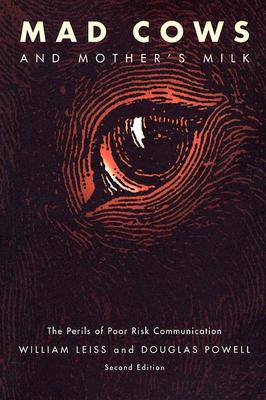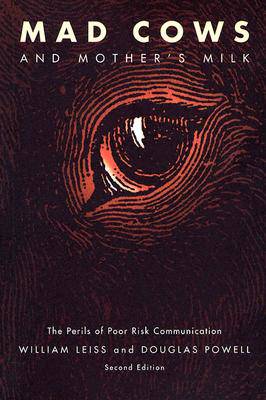
- Retrait gratuit dans votre magasin Club
- 7.000.000 titres dans notre catalogue
- Payer en toute sécurité
- Toujours un magasin près de chez vous
- Retrait gratuit dans votre magasin Club
- 7.000.0000 titres dans notre catalogue
- Payer en toute sécurité
- Toujours un magasin près de chez vous
Mad Cows and Mother's Milk
The Perils of Poor Risk Communication
William Leiss, Douglas Powell
Livre broché | Anglais
51,95 €
+ 103 points
Description
Communicating the nature and consequences of environmental and health risks is still one of the most problematic areas of public policy in Western democracies. Mad Cows and Mother's Milk outlines the crucial role of risk management in dealing with public controversies and analyses risk communication practice to provide a set of lessons for risk managers and communicators. This second edition adds new case studies on mad cow disease in North America, climate change and genetic technologies. The first of the new case studies brings the story of the Bovine Spongiform Encephalopathy (BSE) outbreak in the United Kingdom in the 1980s up-to-date. disease have been found in twenty countries across the European continent and as far away as Japan with devastating consequences for the food industry. BSE has now been discovered on the North American continent in two cows born in Canada. The original cause of these two new cases is almost certainly importation of infected cattle, cattle feed, or both from Britain. Canadian government regulators and those in the cattle industry have failed to correctly assess the risks of the disease in the Canadian herd, take the precautionary measures needed to prevent the spread of disease, and communicate risks and precautionary measures to the public. The second new study deals with global warming. Not only is every aspect of this risk debate both contentious and difficult for the public to understand but the potential consequences of the risks extend all the way to global catastrophe for human civilization. the need for effective and sustained dialogue by an informed public. The last new case study provides an introduction to genomic science, which is placed in the context of both the health benefits expected from genetic manipulation and some of the risk factors associated with it. This new chapter suggests that we must think about the range of new risks introduced by these technologies as well as the potential benefits - and that we should do this collective thinking soon, since given the furious pace of genomics discoveries, the possibilities will be us sooner than we imagine.
Spécifications
Parties prenantes
- Auteur(s) :
- Editeur:
Contenu
- Nombre de pages :
- 452
- Langue:
- Anglais
Caractéristiques
- EAN:
- 9780773528178
- Date de parution :
- 25-11-04
- Format:
- Livre broché
- Format numérique:
- Trade paperback (VS)
- Dimensions :
- 152 mm x 231 mm
- Poids :
- 693 g

Les avis
Nous publions uniquement les avis qui respectent les conditions requises. Consultez nos conditions pour les avis.






